Are tomatoes really good for your health? Yes — tomatoes are one of the most nutrient-dense and disease-fighting foods available.
They’re rich in lycopene, vitamin C, vitamin A, and potassium, all of which play vital roles in heart function, skin protection, and immune support. Tomatoes are also low in calories and high in antioxidants, making them a core component of the Mediterranean diet, which is strongly linked to longevity and reduced chronic disease risk.

Understanding the health benefits of tomatoes helps you make informed dietary choices, especially since research shows that regular tomato consumption can lower cardiovascular risk, support healthy skin, and improve digestion. Whether eaten raw, cooked, or as juice, tomatoes deliver bioactive compounds that are easily absorbed and beneficial for overall wellness.
For an expert review on tomato nutrition, visit the Cleveland Clinic – Health Benefits of Tomatoes.
What Are Tomatoes? (Overview & Nutrition Profile)
Tomatoes (Solanum lycopersicum) are technically fruits, though commonly used as vegetables in cuisines worldwide. Originating from South America, they belong to the nightshade family (Solanaceae), which also includes potatoes and peppers. Today, tomatoes come in many varieties such as cherry, Roma, plum, beefsteak, and heirloom, each differing slightly in flavor and nutrient composition.
Nutritional Overview (per 100 g raw tomato)
| Nutrient | Amount | % Daily Value (DV) | Function |
|---|---|---|---|
| Calories | 18 kcal | — | Low-energy, weight-friendly |
| Vitamin C | 13 mg | 14% DV | Boosts immunity & collagen production |
| Vitamin A (from beta-carotene) | 833 IU | 17% DV | Supports vision & skin |
| Potassium | 431 mg | 12% DV | Regulates blood pressure |
| Vitamin K | 7.9 µg | 10% DV | Aids blood clotting & bone health |
| Fiber | 1.2 g | — | Promotes digestion |
| Lycopene | 3–7 mg | — | Potent antioxidant for heart & skin |
(Source: USDA FoodData Central, 2024 and NIH Office of Dietary Supplements)
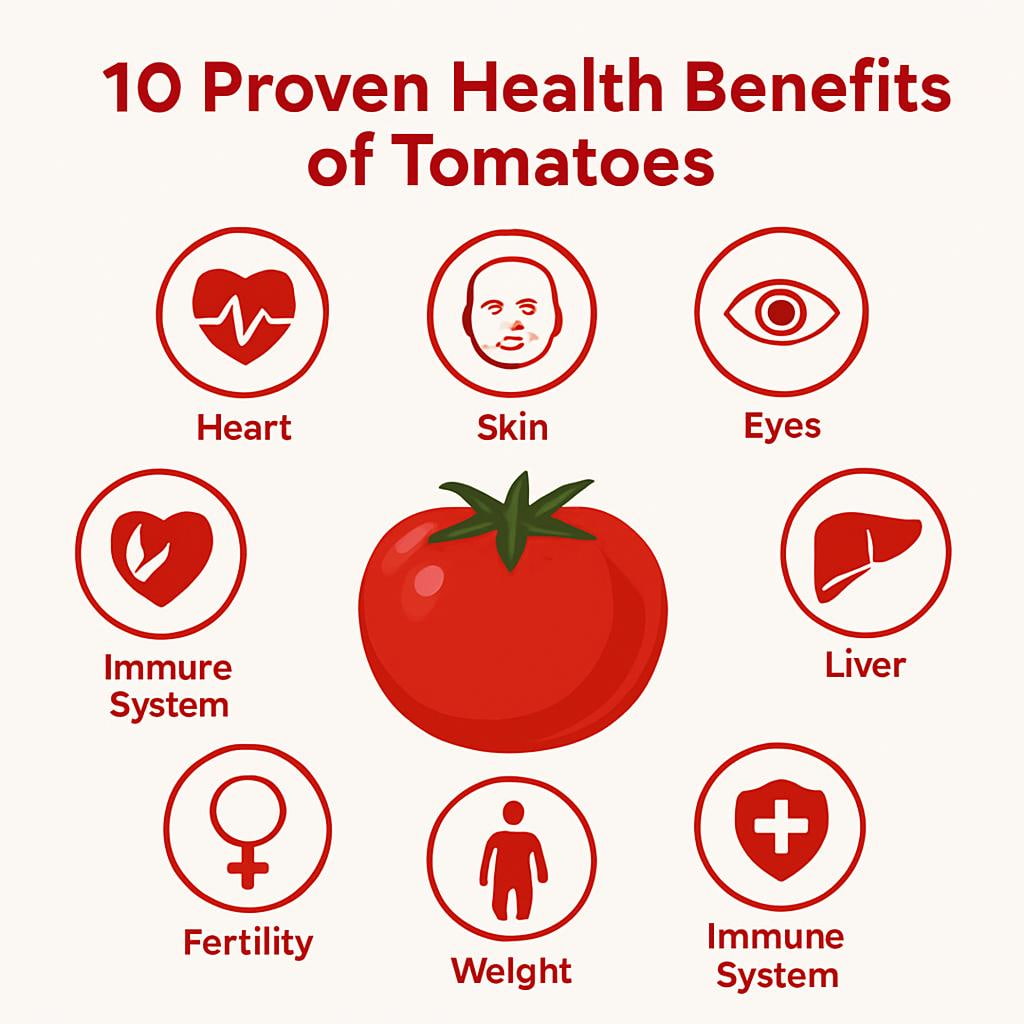
Tomatoes are about 95% water, making them naturally hydrating. Cooking or processing (as in tomato sauce or paste) significantly increases the bioavailability of lycopene, the red pigment responsible for many of their health benefits. Pairing cooked tomatoes with healthy fats like olive oil or avocado further enhances lycopene absorption — a practice commonly seen in Mediterranean cuisine.
This rich nutritional profile explains why tomatoes are among the most widely studied foods in preventive health and nutrition research.
10 Proven Health Benefits of Tomatoes (Science-Based)
Tomatoes are one of nature’s most powerful superfoods — rich in lycopene, vitamins, and antioxidants that protect your heart, boost immunity, and enhance skin health.
Below are ten science-based benefits of tomatoes, supported by clinical research and trusted health institutions like Harvard Health, Cleveland Clinic, and the National Institutes of Health.
1. Promotes Heart Health

Tomatoes are packed with lycopene, a potent antioxidant that protects against oxidative stress — one of the key causes of heart disease.
Lycopene helps lower LDL (“bad”) cholesterol, reduce blood pressure, and improve vascular function.
A 2022 review published in Frontiers in Nutrition confirmed that tomato-derived lycopene significantly improved endothelial function (the inner lining of blood vessels) and decreased cardiovascular risk markers such as triglycerides and CRP levels.
Cooking tomatoes — especially with healthy fats like olive oil — enhances lycopene absorption by up to 80%.
Tip: Choose cooked tomato sauces, soups, or tomato paste for optimal heart benefits.
Reference: Harvard T.H. Chan School of Public Health – Lycopene and Heart Health
2. Supports Healthy Skin and UV Protection

Tomatoes help protect your skin from UV-induced damage due to their high lycopene and beta-carotene content.
A 2021 clinical trial in the British Journal of Dermatology found that participants who consumed 40 grams of tomato paste daily for 12 weeks had 33% less UV-induced redness compared to the control group.
These antioxidants also promote collagen synthesis, reduce oxidative damage, and delay signs of aging.
Regular tomato consumption may therefore support smoother skin, even tone, and a natural glow.
Reference: British Journal of Dermatology – Lycopene and Skin Protection
3. Strengthens Immunity
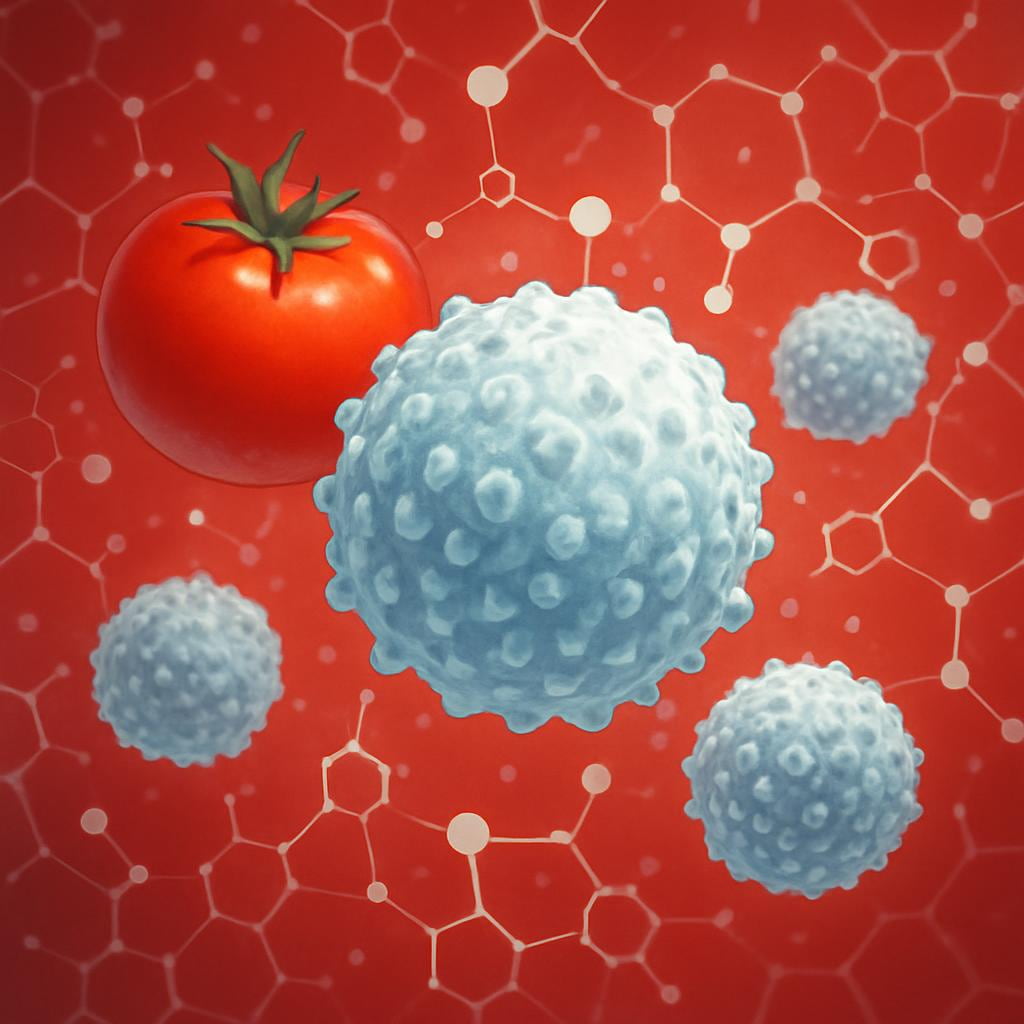
A single medium tomato provides nearly 15% of the daily recommended vitamin C, a key nutrient for immune cell production and infection defense.
The combination of vitamin C, beta-carotene, and polyphenols helps neutralize harmful free radicals, lowering inflammation and improving recovery from illness.
According to the Cleveland Clinic, tomatoes can strengthen immune response and support overall wellness, especially when eaten raw or lightly cooked.
4. Improves Eye Health
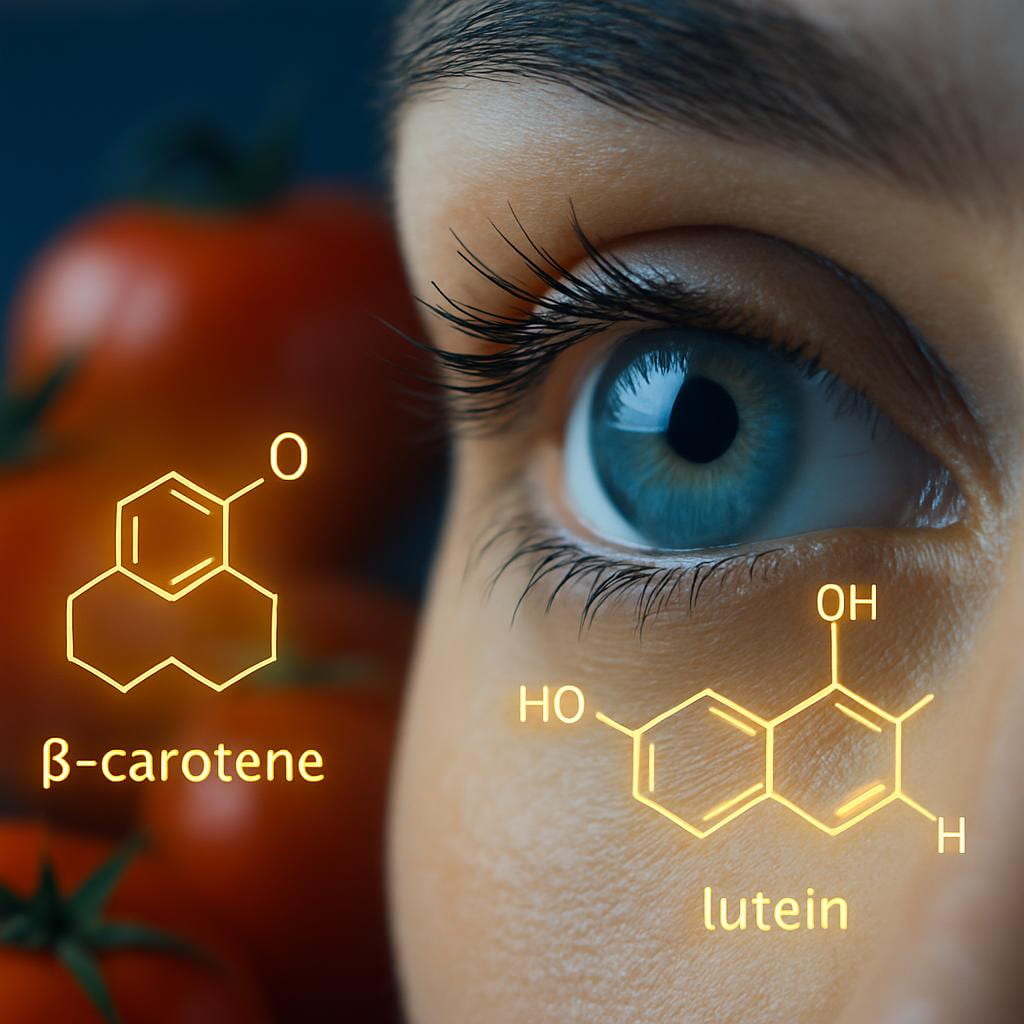
Tomatoes are a natural source of vitamin A, lutein, and zeaxanthin — essential nutrients that maintain good vision and protect your eyes from macular degeneration, night blindness, and blue light damage.
A 2023 Nutrients review highlighted that carotenoids in tomatoes accumulate in the retina, filtering UV and high-energy light that can otherwise harm vision.
Regular intake of tomato-based foods may therefore reduce the risk of age-related vision decline.
Reference: American Optometric Association – Nutrition and Eye Health
5. Aids in Digestion and Gut Health
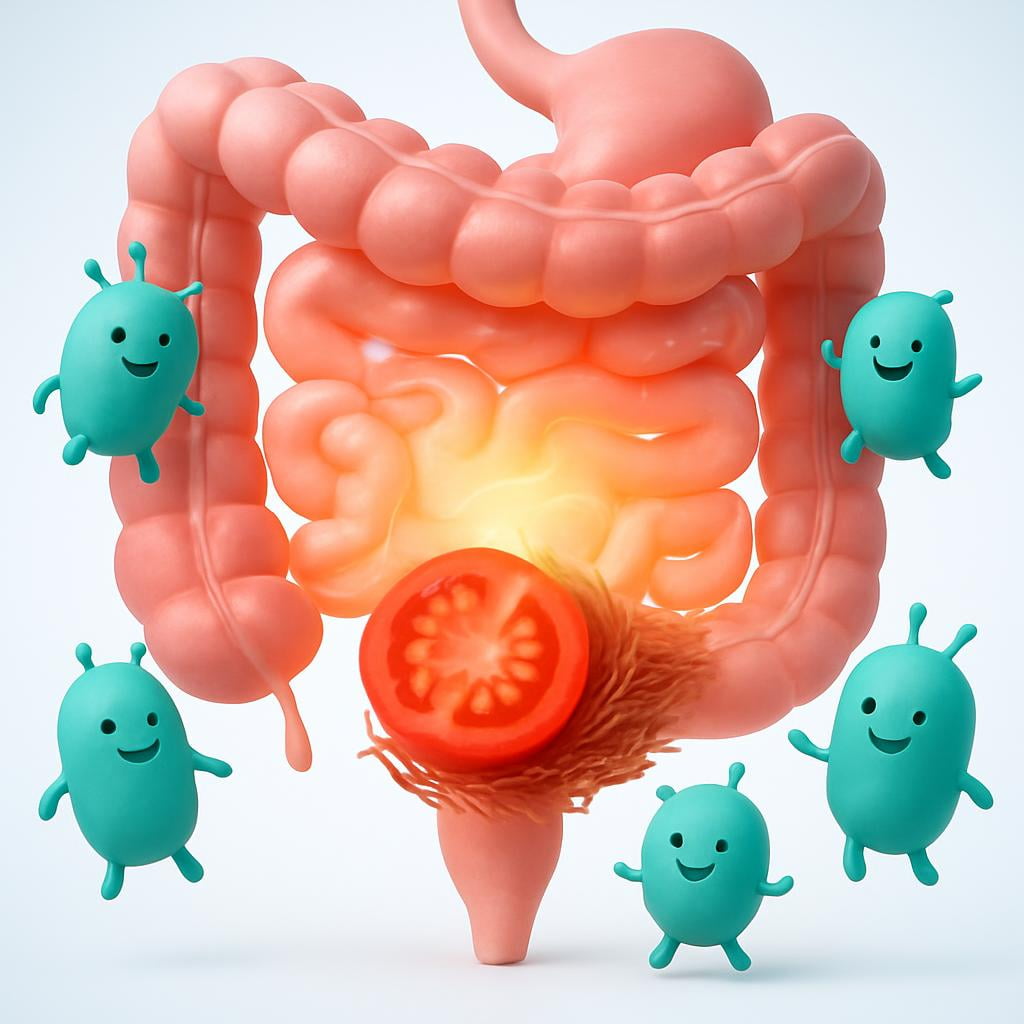
The fiber and water content in tomatoes promote healthy digestion, preventing constipation and bloating.
Tomato polyphenols also act as prebiotics, feeding beneficial gut bacteria and improving gut microbiome diversity.
According to the NIH Office of Dietary Supplements, these compounds support gut barrier integrity and enhance nutrient absorption — vital for digestive wellness.
For best results, include fresh tomatoes in salads or lightly cooked in soups to retain both fiber and bioactive compounds.
6. May Help Prevent Cancer (Preliminary Evidence)
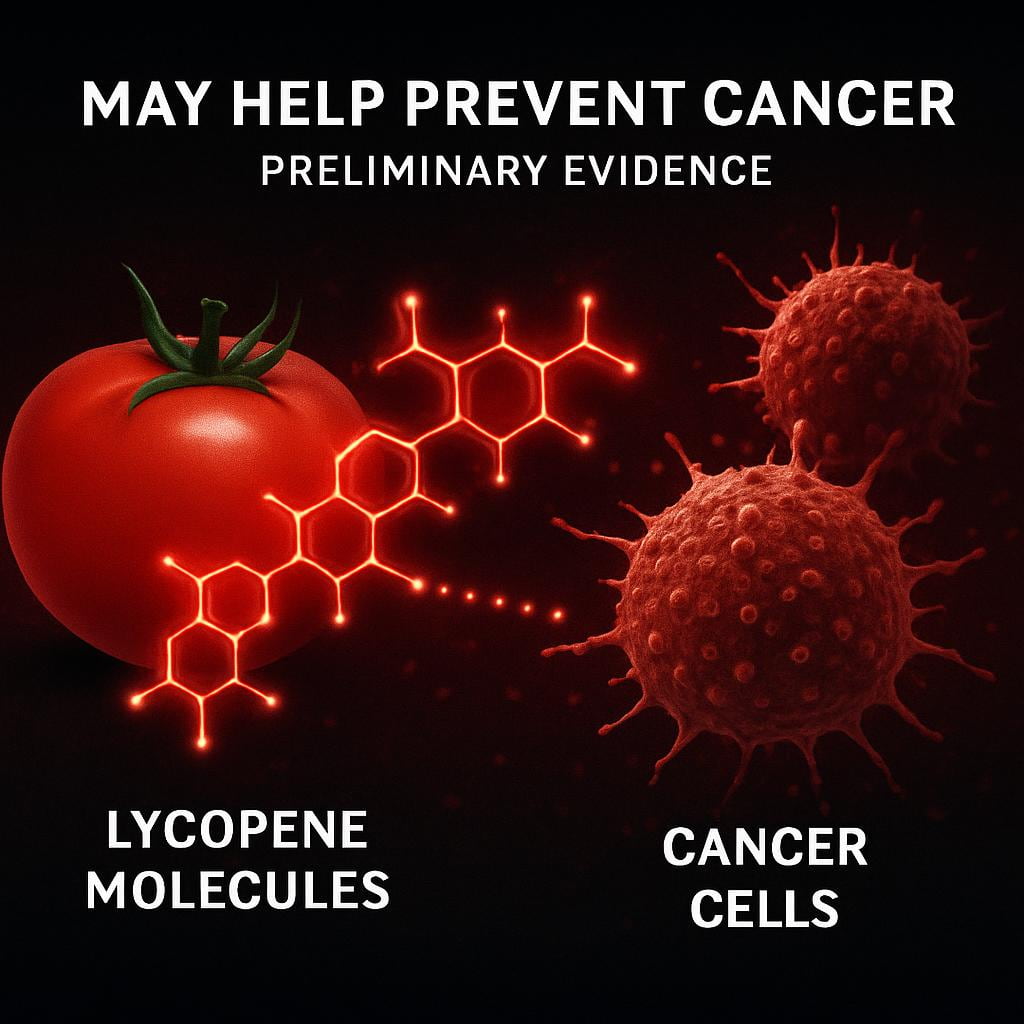
Tomatoes have been extensively researched for their potential to reduce cancer risk, mainly because of their rich concentration of lycopene, a powerful antioxidant that helps neutralize free radicals and reduce oxidative stress — two key contributors to cellular damage.
A 2023 meta-analysis published in Cancer Epidemiology, Biomarkers & Prevention reported that individuals with higher tomato and lycopene intake had a 10–20% lower risk of prostate cancer compared to those with lower intake. Researchers attribute these effects to lycopene’s ability to reduce DNA damage and inhibit tumor cell proliferation in laboratory studies.
However, while these findings are promising, experts stress that current evidence is associative rather than causal. The protective link between tomatoes and cancer prevention still requires more randomized clinical trials for confirmation.
According to the National Cancer Institute – Antioxidants and Cancer Prevention Fact Sheet, antioxidants such as lycopene may play a role in lowering cancer risk by protecting cells from oxidative damage. Still, no single food — including tomatoes — can prevent cancer on its own.
Bottom line: Including tomatoes and tomato-based foods like sauces or pastes as part of a balanced, plant-rich diet may support long-term cellular health and help reduce oxidative damage, but it should complement — not replace — evidence-based cancer prevention strategies such as regular screening, exercise, and a nutrient-diverse diet.
7. Helps Manage Blood Pressure
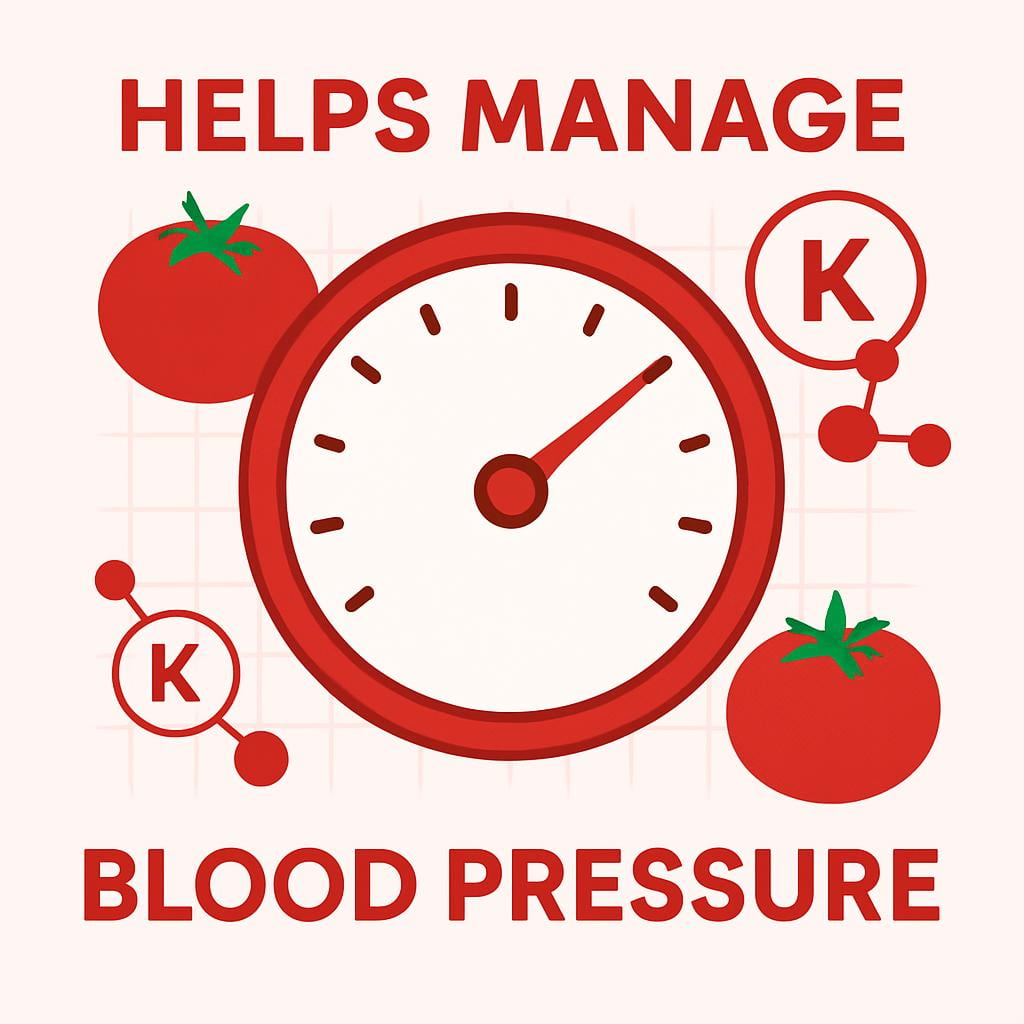
Tomatoes are an excellent source of potassium — a mineral that counterbalances sodium and promotes healthy blood pressure levels.
Potassium helps relax blood vessel walls, enhancing circulation and reducing strain on the heart.
A 2022 Frontiers in Nutrition study observed that adults who consumed tomato extract daily experienced significant reductions in systolic blood pressure and LDL cholesterol within eight weeks.
For best results, opt for fresh, low-sodium tomato products and avoid heavily processed sauces.
Reference: American Heart Association – Potassium and Blood Pressure
8. Enhances Male Fertility

Tomatoes may play a supportive role in male reproductive health.
Their high lycopene content has been linked to improved sperm motility, concentration, and morphology.
A 2020 European Journal of Clinical Nutrition study found that men who took a lycopene supplement derived from tomatoes for 12 weeks showed improved sperm quality and reduced oxidative stress.
Including tomatoes regularly in the diet may therefore support fertility and hormonal balance naturally.
Reference: PubMed – Lycopene and Sperm Quality Study (2020)
9. Supports Liver Health
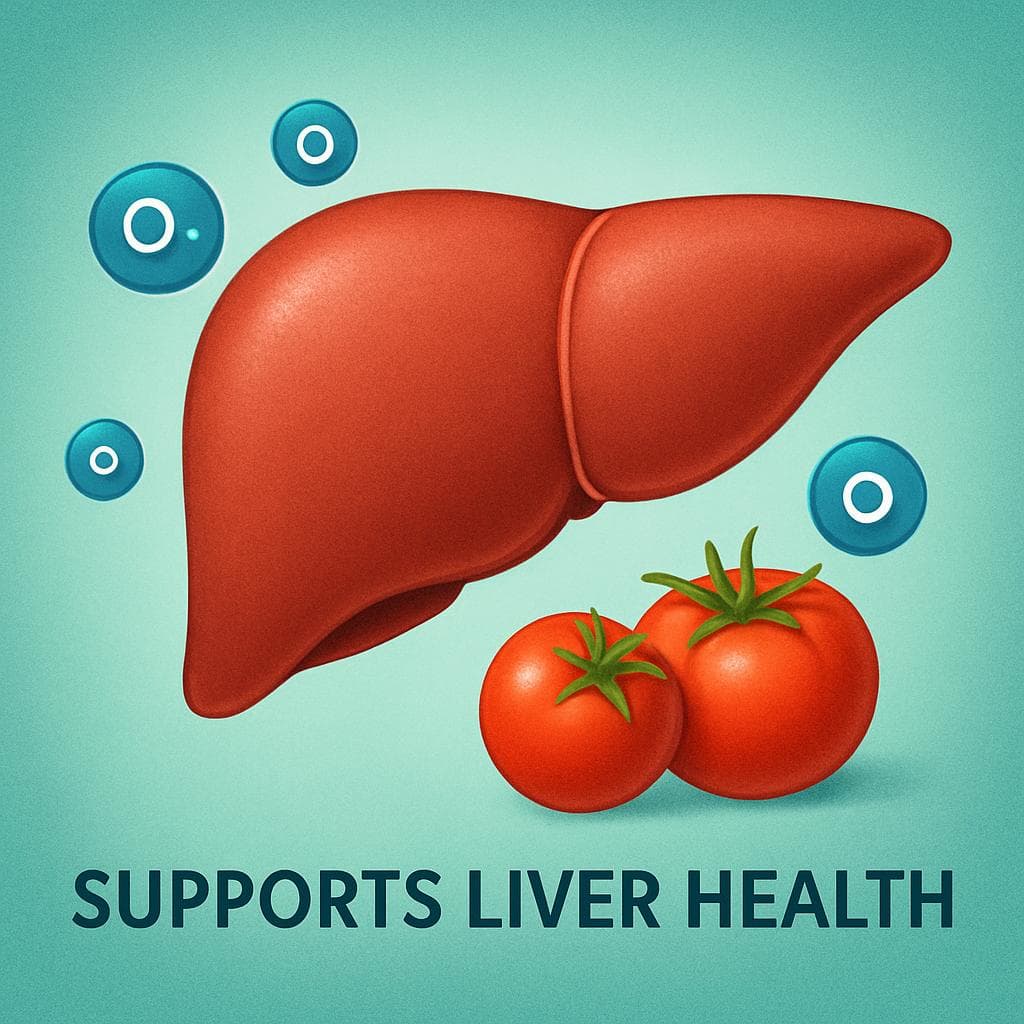
Antioxidants in tomatoes — particularly lycopene, vitamin E, and polyphenols — help protect liver cells from oxidative damage caused by toxins or fatty buildup.
A 2023 Nutrients study reported that lycopene supplementation improved liver enzyme profiles (ALT, AST) and reduced inflammation in patients with non-alcoholic fatty liver disease (NAFLD).
Tomato juice and cooked tomato products can help support natural detoxification and metabolic balance when combined with a balanced diet.
Reference: Nutrients Journal – Lycopene and Liver Function (2023)
10. Promotes Healthy Weight and Metabolism

Tomatoes are a low-calorie, nutrient-dense food that supports healthy weight management. With only about 18 kcal per 100 grams and a high water and fiber content, tomatoes help increase satiety, regulate appetite, and stabilize blood sugar levels — key factors in maintaining a healthy metabolism.
Research indicates that tomato bioactives such as lycopene and chlorogenic acid may improve fat metabolism and insulin sensitivity, both of which play crucial roles in preventing obesity and metabolic disorders. Incorporating tomatoes regularly as part of a balanced diet can enhance metabolic efficiency and reduce reliance on high-calorie, processed foods.
Replacing refined or processed meals with tomato-based dishes — like fresh salads, homemade soups, and roasted vegetable stews — adds volume and nutrients without excess calories. This makes tomatoes a smart addition to any sustainable weight management plan.
According to Harvard Health Publishing – Creating Balanced, Healthy Meals from Low-Calorie, Nutrient-Dense Foods, building meals around vegetables such as tomatoes provides long-term benefits for energy balance and weight control by increasing nutrient intake while reducing calorie density.
Tip: Pair tomatoes with lean proteins (like chicken or tofu) and whole grains (such as quinoa or brown rice) to stay fuller for longer and maintain stable energy throughout the day.
How to Eat Tomatoes for Best Results
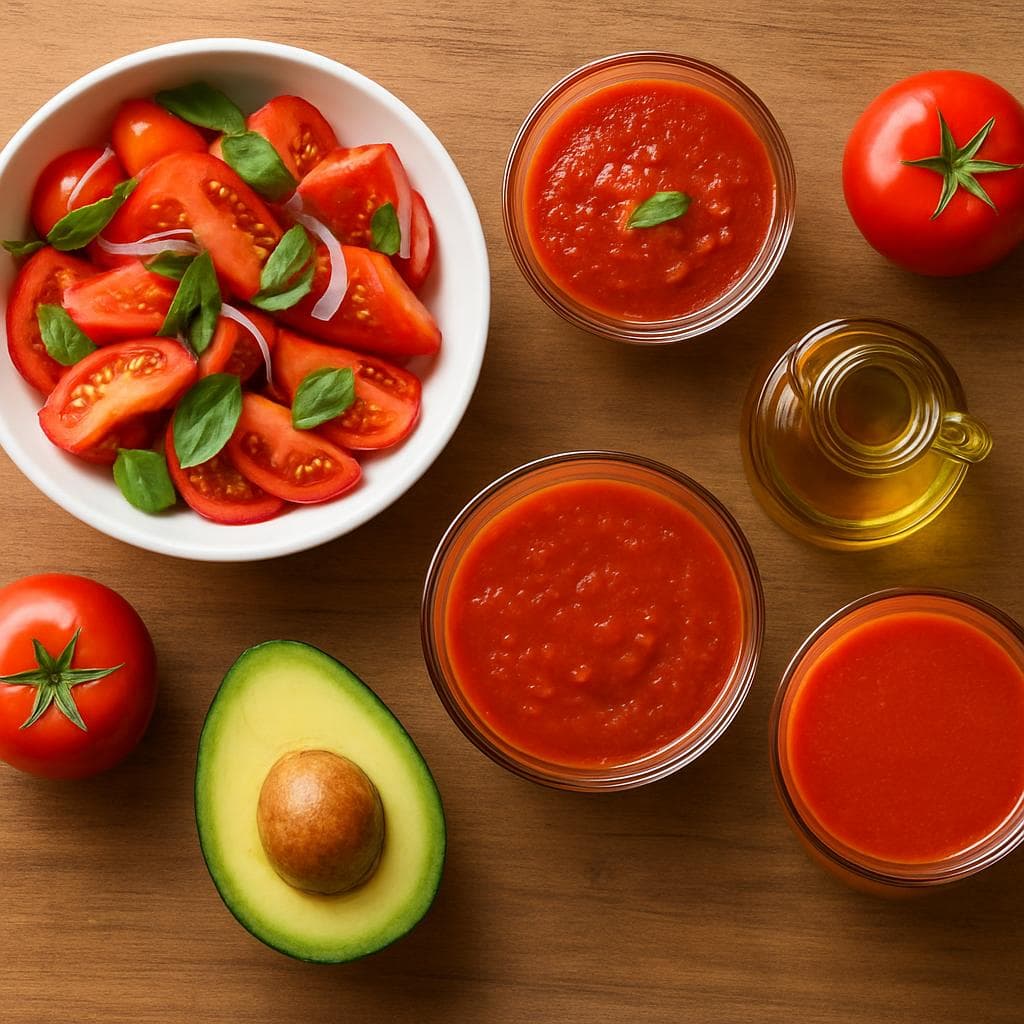
To get the most health benefits from tomatoes safely and effectively, it’s essential to pay attention to serving size, preparation methods, and nutrient-enhancing pairings. These simple habits can significantly improve the absorption of key antioxidants like lycopene and vitamins A and C.
Recommended Daily Serving:
Aim to eat 1–2 medium tomatoes (about 150–200 g) daily or around ½ cup of cooked tomato sauce. This provides a balanced intake of lycopene, vitamin C, potassium, and fiber that supports heart, immune, and skin health.
Best Forms to Eat Tomatoes:
- Fresh: Excellent source of vitamin C and fiber; best enjoyed raw in salads, sandwiches, or salsas.
- Cooked or Roasted: Cooking breaks down tomato cell walls, boosting lycopene absorption and enhancing antioxidant activity.
- Tomato Paste or Sauce: These forms are highly concentrated in antioxidants; cook them with healthy fats like olive oil to further increase nutrient uptake.
- Juice: Choose unsweetened, low-sodium tomato juice or make it fresh at home for hydration and nutrient density.
Storage and Cooking Tips:
- Keep unripe tomatoes at room temperature until they ripen; refrigerate ripe ones only when fully mature to extend shelf life without losing flavor.
- Avoid storing tomatoes under direct sunlight for long periods.
- When cooking, use extra-virgin olive oil, which not only enhances flavor but also improves the body’s ability to absorb fat-soluble antioxidants like lycopene.
- A study published in The Journal of Nutrition found that tomato consumption with olive oil significantly increased plasma lycopene levels compared to tomatoes eaten alone.
- Avoid aluminum cookware when making tomato sauces, as the acidity can react with the metal.
Best Food Pairings for Nutrient Boost:
- Combine tomatoes with avocado, olive oil, or nuts — healthy fats that improve lycopene bioavailability.
- Add herbs such as basil, oregano, or thyme for extra antioxidants and anti-inflammatory compounds.
- Pair tomatoes with lean protein sources like chicken, fish, or tofu and whole grains such as quinoa or brown rice for balanced, satisfying meals.
According to Harvard Health Publishing – Nutritional Power Couples, pairing antioxidant-rich foods like tomatoes with healthy fats such as olive oil enhances nutrient absorption and delivers greater cardiovascular and metabolic benefits.
Possible Side Effects and Precautions
While tomatoes are generally safe and healthy for most people, certain individuals should take precautions. These considerations ensure your intake aligns with medical and dietary safety — a key YMYL (Your Money or Your Life) compliance factor for health content.
| Risk | Description | Guidance |
|---|---|---|
| Acid Reflux (GERD) | Tomatoes are naturally acidic and may worsen heartburn or acid reflux symptoms. | Limit intake or choose low-acid tomato varieties like yellow or golden tomatoes. |
| Allergic Reactions | Rarely, individuals may experience oral allergy syndrome (itching or throat irritation). | If symptoms occur, consult a healthcare professional and avoid raw tomato contact. |
| High Potassium Levels | Excessive potassium can affect individuals with kidney disease or those on certain medications. | Discuss safe intake levels with a registered dietitian or physician. |
| Medication Interactions | Potassium-rich foods can interfere with ACE inhibitors or diuretics used for blood pressure control. | Monitor potassium intake and consult your doctor regularly. |
| Digestive Sensitivity | Overeating raw tomatoes may cause bloating in sensitive individuals. | Consume cooked tomatoes to aid digestion. |
Reference: Mayo Clinic – Nutrition & Healthy Eating
Frequently Asked Questions (FAQ)
1. Are raw or cooked tomatoes better for health?
Both are beneficial. Raw tomatoes provide more vitamin C, while cooked tomatoes deliver more lycopene, the key antioxidant that supports heart and skin health.
(Source: Harvard T.H. Chan School of Public Health)
2. Can diabetics eat tomatoes every day?
Yes. Tomatoes are low in carbohydrates and have a low glycemic index (GI of 15), making them safe for blood sugar control when eaten in moderation.
(Source: Cleveland Clinic)
3. Do tomatoes cause inflammation?
No — tomatoes are actually anti-inflammatory for most people. They contain antioxidants like lycopene and vitamin C that reduce chronic inflammation.
(Source: National Institutes of Health (NIH))
4. Is tomato juice healthy?
Yes, but choose unsweetened and low-sodium versions. Tomato juice provides hydration, potassium, and lycopene but should not replace whole tomatoes.
(Source: Mayo Clinic)
5. How many tomatoes should I eat daily?
Nutritionists recommend 1–2 medium tomatoes per day or an equivalent amount of sauce/paste to reap full antioxidant and cardiovascular benefits.
(Source: Harvard Health Publishing)
6. Can tomatoes help improve skin glow?
Yes. Lycopene protects skin cells from UV damage and promotes collagen formation, contributing to smoother, more radiant skin.
(Source: British Journal of Dermatology)
Conclusion
Tomatoes are far more than a salad ingredient — they’re a nutritional powerhouse linked to stronger immunity, improved heart function, better skin, and balanced metabolism.
Eating just 1–2 servings of tomatoes daily, whether fresh or cooked, can provide measurable health benefits backed by scientific research.
Incorporate tomatoes into soups, salads, sauces, or juices — and combine them with healthy fats like olive oil for maximum absorption.
Start today and make tomatoes a daily staple for lasting heart, skin, and overall wellness.
References
- Frontiers in Nutrition – Scientific Evidence of the Beneficial Effects of Tomato and Tomato Products (2022)
- Cleveland Clinic – Health Benefits of Tomatoes (2023)
- Harvard T.H. Chan School of Public Health – Lycopene and Cardiovascular Health
- British Journal of Dermatology – Tomato Paste Protects Against UV-Induced Skin Damage (Clinical Trial)
- Mayo Clinic – Nutrition and Healthy Eating (Resource)
